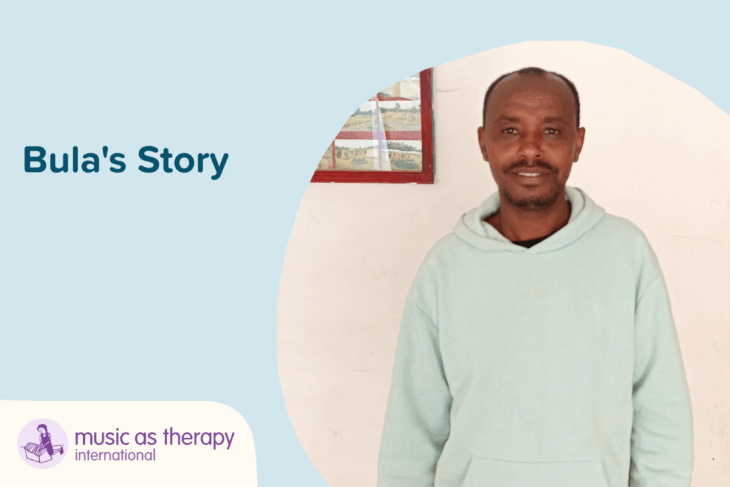Connecting through Music at Gefersa Mental Health Rehabilitation
Ethiopia
- Adults
- Caregivers
- Mental health

(ይህንን ፖስት (ልጥፍ) በአማርኛ ማንበብ ትችላላችሁ፡፡)
Bula Etana is the Nurse and Quality Officer at Gefersa Mental Rehabilitation Centre, a part of the Ethiopian Prosthetic and Orthotic Service (EPOS). Bula’s nursing responsibilities include caring for patients, and his Quality Officer responsibilities include creating protocols and standard procedures for the rehab centre and certain therapies (such as music and art therapy) and creating protocols to develop these activities. Bula has been working at the centre for 9 years and is committed to making the centre a nice setting for patients. Bula has a musical background as he plays the guitar and keyboard and creates his own songs.
Bula is the only remaining member of staff still working at the centre who participated in the very first music training delivered by Music Therapist Hannah Berhanu and Lily Blows-Paliwoda in 2018, and since then he has continued to lead and assist music sessions occasionally. In 2022, more colleagues were trained to use music by Music Therapists Erin Williams-Jones and Emma Britton. Now music sessions tend to happen every Thursday. However, Bula feels that once a week is not enough and music sessions happening twice each week would be better.
Reflecting on his initial music training, Bula recalls being fascinated by the very first music session he saw Hannah and Lily lead, especially as it was something new, and the information shared by Hannah was interesting. He learnt to use music in individual sessions and often saw how music would evoke patients’ memories and allow them to speak about their personal experiences in the past.
I learnt from the music therapist the type of 1 to 1. When I use that with a patient, he started a song with that music. He’s remembering his previous history. He starts singing his memory. I remember that one. I asked him why he select that type of music, he told me his story with that song.
Bula remembers the first music session he ever led: How difficult it was to attract his first selected patient to the session and to guide him through the musical activities. But over time running sessions became much easier for Bula.
Bula feels proud when patients are playing musical instruments and tell their life stories (which is why he prefers individual sessions over large group sessions). For Bula, individual sessions offer more opportunity for patients to express their feelings and connect more with him. In comparison, he finds it harder to build a deeper connection with patients in group sessions, when the focus is often on enjoyment for patients. Bula has recently restarted his individual music sessions and he would like to see more colleagues learn to use music one to one with patients.
At the moment, around 30 patients participate in music sessions at the centre and Bula can see the benefits for the patients. For example, one patient has been at the centre for more than 5 years and participated in many music sessions.
I have aims for him. I know that music therapy is very good for him… You know people express their feelings by music. When they sing, they are free.
This patient has schizophrenia and can be very active because of the illness and at times have disorganised thinking during conversations, but music sessions have helped him make progress:
On the first days he needed a reward, but now he is not doing that. When you call him, he start to come and participate. He is looking at it now as enjoyment. Even he is asking if there is any music therapy. He is asking by himself now.
Bula has noticed similar progress with other patients. Patients are voluntarily participating in sessions, find enjoyment in sessions. They are expressing themselves freely and talking about their life experiences, which has been helping them to connect with others and have positive benefits with their mental illness.
Bula believes music used in a therapeutic way is important because he sees patients can express themselves via music and remain active, the very same benefits when Bula would listen to music and sing to express himself.
Bula sees that Gefersa Mental Health Rehabilitation Centre has benefited from the ongoing support from music therapists and Music as Therapy International as music sessions are one of the activities that the centre continues to offer. But he does wonder if what he has already learnt about music therapy is enough or if there is more to learn, especially as a one-month training seems short whereas his training to be a nurse took a few years. Bula also had a question about receiving a degree or diploma type of certificate to show qualifications to use music in a therapeutic way.
Related projects
-
Partner Newsletter: Ethiopia 2024
Ethiopia
- Adults
- Caregivers
- Disability
- Elderly
- Mental health
- Young people
